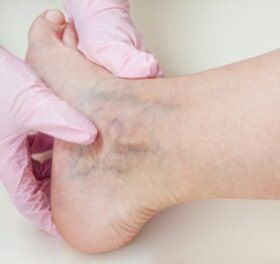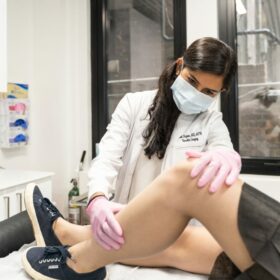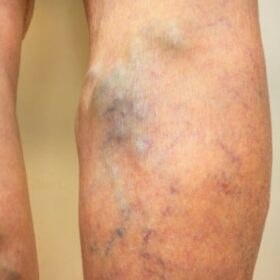What effect does sclerotherapy have on varicose veins?
Sclerotherapy is a medical procedure used to treat varicose veins. It involves injecting a solution called a sclerosant into the affected vein, which causes the vein to close and eventually disappear. During sclerotherapy, the sclerosant solution is injected directly into the varicose vein using a very fine needle. The solution irritates the lining of the vein, causing it to swell and close off. Over time, the vein will be replaced with scar tissue, which will eventually get reabsorbed by the body and fade away from the skin’s surface.
Sclerotherapy can be an effective treatment for varicose veins, but it is not a permanent solution. The veins may return if the underlying cause of the varicosity is not addressed, such as chronic venous insufficiency. Furthermore, sclerotherapy is more suitable for spider veins and extremely small varicose veins — not large, bulging varicose veins. Your vein doctor must examine your varicose veins and diagnose the root cause before determining if you’re a good candidate for sclerotherapy or if you need other minimally invasive procedures.
Vein Treatment Clinic is a group of state-of-the-art vein clinics specializing in the latest and safest minimally invasive procedures for varicose veins. Our highly-skilled, board-certified vein doctors carefully examine your leg veins, discuss your symptoms, and administer the latest imaging tests to diagnose the root cause of varicose veins before curating a personalized treatment plan. You can find our vein treatment clinics in New York, Long Island, New Jersey, California, and Maryland. Please schedule an appointment at your nearest vein center.
How effective is sclerotherapy for varicose veins?
Sclerotherapy is generally considered to be an effective treatment for varicose veins, especially when used in combination with other treatments, such as compression stockings or laser ablation. Researchers have found that sclerotherapy is effective in reducing the appearance of varicose veins in 78% of patients. However, the effectiveness of sclerotherapy can vary depending on the size and location of the veins being treated and the type of sclerosant used. Furthermore, some may need multiple treatments to achieve the desired results.
Can sclerotherapy make varicose veins worse?
It is rare for sclerotherapy to make varicose veins worse, but it is possible in some cases. If the sclerosant solution is injected too aggressively or the vein is not treated correctly, it could lead to the vein becoming more prominent or visible. In some cases, the sclerosant solution may cause the vein to become more painful or inflamed. This is usually a temporary side effect that will resolve on its own.
Do varicose veins come back after sclerotherapy?
It is possible for varicose veins to return after sclerotherapy, especially if the underlying cause of the varicosity is not addressed. Varicose veins are usually indicative of chronic venous insufficiency, a medical condition wherein the collapse of vein valves leads to backward blood flow and the accumulation of blood in leg veins. If varicose veins are treated without addressing the root cause, you may soon develop new varicose veins.
In some cases, varicose veins may return even if the underlying cause is addressed. This can be due to the natural progression of the condition or the fact that not all of the affected veins were treated during the sclerotherapy procedure. You must find vein doctors who perform thorough duplex ultrasound tests to visualize the blood flow in your leg veins, identify the root cause of varicose veins, and curate personalized treatment plans to ensure consistent results.
What are the dangers of sclerotherapy?
Sclerotherapy is generally a safe and effective treatment for varicose veins, but like any medical procedure, it carries some risks. Some of the potential dangers of sclerotherapy include:
- Allergic reactions to the sclerosant solution
- Blood clots
- Vein inflammation
- Swelling or bruising at the injection site
- Skin irritation or discoloration
In rare cases, sclerotherapy can lead to more serious complications, such as nerve damage or skin ulcers. It is important to discuss the potential risks with your doctor before undergoing sclerotherapy. Our vein doctors have performed thousands of successful sclerotherapy procedures because they curate personalized treatment plans and use the latest and safest techniques to ensure optimal comfort with minimal side effects.
What happens if I don’t wear compression stockings after sclerotherapy?
Compression stockings are often recommended after sclerotherapy to improve circulation and reduce the risk of complications. They apply gentle pressure to the legs to improve blood flow and prevent fluid from pooling in the veins. If you don’t wear compression stockings after sclerotherapy, you may be at a higher risk of developing complications, such as blood clots or vein inflammation. In some cases, not wearing compression stockings after sclerotherapy can also increase the risk of varicose veins returning.
How many sessions of sclerotherapy is needed for varicose veins?
The number of sclerotherapy sessions needed to treat varicose veins can vary depending on the size and location of the veins and the severity of the condition. Some people may see improvement after just one session, while others may need multiple treatments. In general, it is not uncommon for people to need 2-3 sclerotherapy sessions to fully treat their varicose veins. These sessions are usually spaced several weeks apart to allow time for the body to heal.
Who should not get sclerotherapy?
Sclerotherapy is generally considered to be a safe and effective treatment for varicose veins, but it may not be suitable for everyone. People who should not get sclerotherapy include:
- Pregnant women
- People with a history of blood clots
- People with certain allergies, such as allergies to the sclerosant solution
- People with skin infections or sores in the area to be treated
- People with certain medical conditions, such as kidney disease or diabetes
It is important to discuss your medical history and any existing health conditions with your vein doctor before undergoing sclerotherapy. Your vein doctor will determine if sclerotherapy is a safe and appropriate treatment for you based on your individual circumstances.











